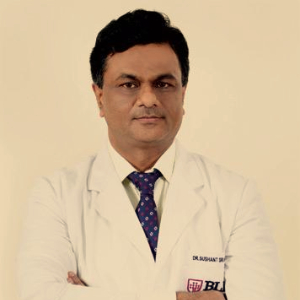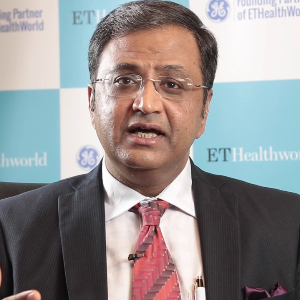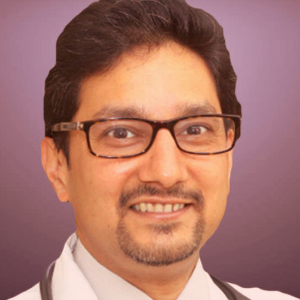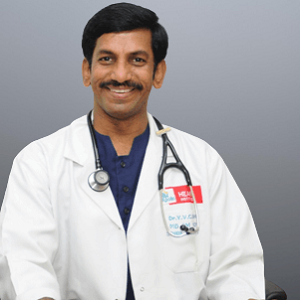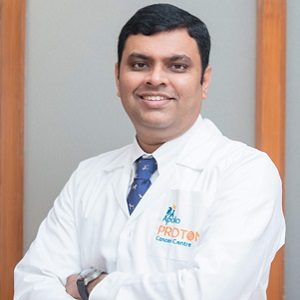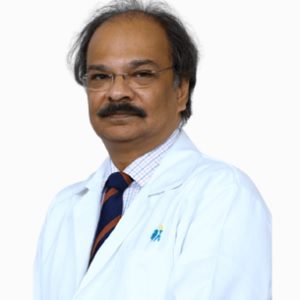Best Doctors in India for Alcoholic Hepatitis Treatment
- Chairperson Heart & Lungs Transplant, New Delhi, India
- Over 20 years’ experience
- Artemis Hospital, Gurgaon
Profile Highlights:
- Dr. Sushant Srivastava is a highly respected Cardio-Vascular Surgeon with a distinguished career spanning over two decades.
- He is currently the Chairperson for Heart & Lungs Transplant at Artemis Hospitals, Gurugram.
- An expert in Cardio Thoracic and Vascular Surgery, Dr. Srivastava has performed over 10,000 surgeries, making significant contributions to the field with his expertise in complex procedures.
- Neurosurgeon, Chennai, India
- Over 35 years’ experience
Profile Highlights:
- Dr. K Sridhar is a renowned Neurosurgeon who has an experience of 35+ years in brain and spine surgery and has performed over 1000 complex brain tumor surgeries.
- His primary area of interest is skull base surgery, micro neurosurgery, and spine surgery, and is currently working on lesions of the brain stem.
- Top Interventional Cardiologist | Fortis Escorts, New Delhi, India
- 20+ Years Experience
- Fortis Escorts Heart Institute New Delhi
Profile Highlights:
- Dr. Vishal Rastogi is a distinguished Interventional Cardiologist and the Director of the Interventional Cardiology & Advanced Heart Failure Programme at Fortis Okhla.
- With over 20 years of experience, Dr. Rastogi has established himself as a leading expert in the field.
- Academically, Dr. Rastogi holds an MBBS, MD, and DM, reflecting his deep commitment to medical excellence.
- Interventional Cardiologist, Chennai, India
- Over 25 years’ experience
- Apollo Hospitals Greams Road
Profile Highlights:
- Dr. Y Vijayachandra Reddy is an interventional cardiologist with 25+ years of experience.
- Dr. Reddy’s work experience includes more than 7000 PCIs, 30000 invasive procedures, 550 PCIs in cardiogenic shock, 700 Cardiac devices, 400 PTMCs, and several EVAR and TEVAR procedures.
- His expertise lies in pacemaker implantations, pediatric interventions, ICDs, CRTs, endovascular repairs, and more.
- Top Rheumatologist | Rela Hospital, Chennai, India
- 32+ Years Experience
- Apollo Hospitals Greams Road, Dr. Rela Institute & Medical Centre
Profile Highlights:
- Dr. Brig K Shanmuganandan is one of the finest rheumatologists based in Chennai, boasting over 20 years of dedicated experience in the field.
- With an impressive educational background that includes an MBBS, MD in Medicine, DNB in Medicine, and a Fellowship in Rheumatology, Dr. Shanmuganandan has established himself as a leading expert in his specialty.
- His expertise lies in diagnosing and treating a variety of complex conditions, such as musculoskeletal infections, rheumatoid arthritis, systemic lupus erythematosus, Sjogren’s syndrome, and other musculoskeletal disorders.
- Pulmonologist, Chennai, India
- Over 7 years’ experience
- Apollo Hospitals Greams Road
Profile Highlights:
- Dr. Jebin Roger S is a dedicated specialist in Pulmonary Medicine with over 7 years of experience, focusing on asthma and allergy management. Currently, he is associated with Apollo Hospital, Chennai as a Consultant Pulmonologist.
- He holds an MD in Pulmonary Medicine and a Diploma in Allergy and Asthma from CMC Vellore, complemented by a DNB in Pulmonary Medicine.
- Dr. Jebin has made significant contributions to the field of respiratory medicine through his roles as a faculty member in various workshops on ultrasound, bronchoscopy, thoracoscopy, spirometry, and asthma and allergy. He was also the Organizing Secretary for the National Allergy and Immunology Conference (ALLERGOCON) in 2019 and 2020.
- Radiation Oncologist, Chennai, India
- Over 15 years’ experience
- Apollo Proton Cancer Centre
Profile Highlights:
- Dr. Srinivas Chilukuri has been in one of the top layers of Oncologists in India. He is a renowned Radiation Oncologist with extensive experience. He is also a major thought leader in the field, particularly with regard to high precision radiation treatment, which includes Particle Beam Radiation.
- Orthopedic Surgeon & Spine Surgeon, Mumbai, India
- Over 25 years’ experience
- Lilavati Hospital & Research Centre
Profile Highlights:
- Dr. Ram Chaddha is a specialist Spine Surgeon in Mumbai with expertise in the management and treatment of all kinds of spinal disorders for over 25 years.
- Dr. Chaddha is trained in Minimally Invasive Spine Surgery and is also among the few surgeons in India to hold expertise in Minimally Invasive Cosmetic Spine Surgery.
- Dr. Ram Chaddha spent a considerable number of years training undergraduate and postgraduate students and has also been an examiner for such courses at Mumbai University.
- Rheumatologist, Chennai, India
- Over 36 years’ experience
- Apollo Hospitals Greams Road
Profile Highlights:
- Rajasekar B is a recognized Rheumatologist from India having an experience of 36 years in this field.
- Patients can contact him for treatment and consultation for various rheumatology-related issues.
- He has published many studies in prominent Indian and International journals.
- GI Surgeon and Liver Transplant Surgeon, Gurugram, India
- Over 20 years’ experience
- Medanta-The Medicity, Gurgaon
Profile Highlights:
- Dr. Amit Nath Rastogi is a pioneer in the field of liver transplant surgery. He completed his fellowship in liver transplant surgery at Sir Gangaram hospital while being a part of the largest liver transplant program in the country.
- Furthermore, he received his training in robotic liver surgery from IRCAD -Strasbourg, France, and advanced robotic HPB training from Grosseto.
Best Hospitals in India for Alcoholic Hepatitis Treatment
ALCOHOLIC HEPATITIS
Alcoholic hepatitis is a liver infection, which is mainly caused by frequent, heavy use of alcohol. Fat can build up in the liver cells, which might lead to inflammation as well as scarring of the liver.
Alcoholic hepatitis might be mild or severe. A patient might even need a liver transplant if proper treatment is not provided, or if they don’t stop consumption of alcohol.
It is also notable that all heavy drinkers don’t develop this condition, and sometimes this condition even develops in people who drink moderately. However, if you are diagnosed with this condition, it is important for you to quit drinking alcohol. People who continue drinking alcohol might face a huge risk of serious liver damage as well as death.
Symptoms
Depending on the amount of damage to the liver, the symptoms can vary. If you are having a mild form of the disease, you might not even experience any symptoms at all. However, as the damage continues to grow, you might experience the following:
- Changes in appetite
- Dry mouth
- Weight loss
- Pain or swelling in the abdomen
- Jaundice, or yellowing of the skin or eyes
- Fever
- Nausea and vomiting
- Easy bleeding or bruising
- Changes in your mental state, including confusion
- Fatigue
The symptoms of this condition are similar to those caused by a few other health conditions. Therefore, if you develop any of these symptoms, it is best to get a proper diagnosis as well as begin treatment.
Causes & risk factors
Alcoholic hepatitis generally develops when the alcohol you drink causes damage to your liver. However, it is not clear why alcohol does this damages only to some heavy drinkers.
Few factors that are known to play a role in this condition include:
- The body’s process that breaks down alcohol produces some toxic chemicals
- These chemicals can trigger inflammation that can destroy the liver cells
- Thus, over time, scars replace healthy liver tissue, thus interfering with the function of the liver
- This irreversible scarring, which is also termed cirrhosis, is the final stage of alcoholic liver disease
If you have hepatitis C and continue to drink, even moderately, you are more likely to develop cirrhosis.
Some heavy drinkers are also malnourished because they don’t eat a proper balanced diet. Alcohol and its byproducts also prevent the body from absorbing nutrition properly. Lack of nutrition can contribute to liver cell damage.
Some other risk factors that can lead to this condition include:
- Your sex- Women are usually at a higher risk of developing alcoholic hepatitis since the way alcohol is processed in women is different.
- Binge drinking- Having over five drinks within two hours for men and four or more for women can increase the risk of alcoholic hepatitis.
- Obesity- Heavy drinkers who are overweight are also more likely to develop alcoholic hepatitis and to progress from that condition to cirrhosis.
- Race and ethnicity- Hispanic and Negroid people might be at higher risk of alcoholic hepatitis.
- Genetic factors- According to studies, there may be a genetic component in alcohol-induced liver disease. However, it is difficult to separate genetic and environmental factors.
Diagnosis
If you are showing symptoms of alcoholic hepatitis, your doctor will first inquire about your medical history and alcohol consumption. Next, he/she will perform a physical exam to see if you have an enlarged liver or spleen. They might also need a few more tests to confirm your diagnosis, such as:
- Complete blood count (CBC)
- Liver function test
- Ultrasound of the liver
- Abdominal CT scan
- Blood clotting tests
In some cases, a liver biopsy might also be needed to confirm the diagnosis of alcoholic hepatitis. A liver biopsy requires your doctor to remove a tissue sample from your liver, which is then tested in the lab. This method helps to show the severity and type of liver disease.
Treatment
Stopping alcohol consumption is the most important treatment for alcoholic hepatitis. There is no cure for this condition, but treatment can help in reducing or eliminating symptoms, or stopping its progression.
It is also important to note that scarring of the liver is permanent, but treatment can aim to restore as much function as possible.
Dietary changes
Medication
Liver transplant
The best hope of recovery is to be aware of the signs and symptoms as well as to reduce, manage, or if possible, completely stop consumption of alcohol.
Complications
Alcoholic hepatitis might lead to severe other complications such as:
- Enlarged veins (varices)- In this condition, blood that is unable to flow freely through the portal vein, can back up into other blood vessels in your esophagus or stomach.
- Hepatic encephalopathy- This condition can be caused by the buildup of toxins if your damaged liver is unable to remove all the toxins from your body. It involves confusion, drowsiness, and slurred speech.
- Ascites- Ascites is a condition in which the fluid that accumulates in the abdomen may get infected and thus, require treatment with antibiotics. Although this condition is not life-threatening, it can be a sign of advanced alcoholic hepatitis, or cirrhosis.
- Kidney failure- A damaged liver affects blood flow to the kidneys, thus resulting in kidney failure.
- Cirrhosis- The scarring of the liver might lead to liver failure.
Prevention
Alcoholic hepatitis might be prevented if you take the following steps:
- Drink alcohol in moderation, if at all- For healthy adults, moderate drinking means no more than one drink a day for women of all ages and men older than 65, and not over two drinks a day for men aged 65 and younger. However, if you prevent all alcohol, it is a certain way to prevent this condition.
- Check before mixing medications and alcohol- Ask your doctor if it’s safe to drink alcohol while you are taking medications. Consider reading the warning labels on over-the-counter medications as well. Don’t drink alcohol when you are taking medications that warn of complications when combined with alcohol.
- Protect yourself from hepatitis C- Hepatitis C is an infectious liver disease that is caused by a virus. If it is left untreated, it may lead to cirrhosis. If you are having hepatitis C and you consume alcohol, you’re generally more likely to develop cirrhosis than if you don’t drink.

